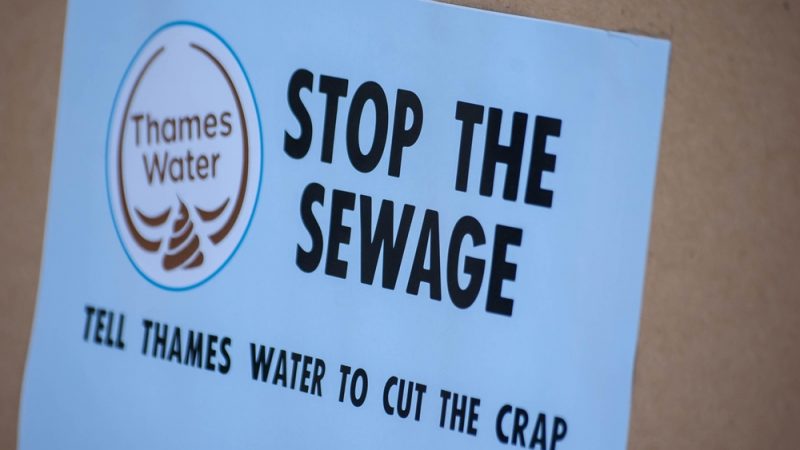
Ofwat is currently deciding whether to let Thames Water pollute our rivers and seas outside of current legal limits for the next 15 years.
As many of us are already acutely aware, Thames Water is crumbling. It has a debt pile of approximately £20 billion. Households are paying more and more for a broken service. Burst pipes, water outages and road closures have all become new norms. Last year, Thames Water had the highest rate of serious pollution incidents out of all the English water companies.
In an attempt to keep hold of the utility, Thames Water’s creditors (mostly US hedge funds and investment firms that are now using the name London and Valley Water) have put forward a deal to water regulator Ofwat. As part of this deal, they have stated that a ‘full return to legal, regulatory and environmental compliance’ would not take place until at least 2035-2040. Instead, they have put forward their own ‘improvement accountability framework’ as a set of obligations which they are prepared to keep. What does this mean in practice? Thames Water’s creditors want to set their own rules.
Here are five clear reasons why this deal must not go ahead.
It would result in 15 more years of pollution of our rivers and seas
The deal proposes an expected return to full environmental compliance in 2035-2040, meaning they will be breaching their licence until at least that time. Our rivers and seas simply cannot withstand 15 more years of pollution.
It would set a dangerous precedent for all other English water companies
If Thames Water can set their own rules – and protect their profits as a result – all other water companies will want to do the same. This decision impacts not just Thames Water households, but every single household in England.
There is a complete lack of transparency and accountability
Details of the ‘improved accountability framework’ have not been made clear to members of the public. We fund the water system through our bills, and rely on water companies to deliver this essential service. We are the biggest and most important group of stakeholders in our water system, and deserve a say in how it is run. Water is a natural monopoly, meaning that we cannot simply choose to get our water somewhere else if the terms and conditions of one provider don’t suit us.
READ MORE: ‘Public ownership unites right and left – and will help Labour defeat Reform’
It is not the best value for the public purse
Thames Water creditors have offered a 25% debt write-off. Much more debt would be written off under special administration. The previous government’s plans under Project Timber involved a 40% debt haircut for some creditors. We could cut more.
This is not what this government promised
This government promised to be tough on water pollution, including a pledge that sewage pollution will be cut in half by the end of the decade. In this deal, Thames Water creditors set out an ‘ambition’ – not even a commitment – to reduce sewage outflows 30% by 2030, which falls significantly short of former Environment Secretary Steve Reed’s target.
What’s more, Reed has specifically said of Thames Water that ‘it is only right that the company is subject to the same consequences as any other water company’.
By accepting this deal, this government would be undermining their promised action on sewage not just ahead of the next election, but for the two elections after that.
Subscribe here to our daily newsletter roundup of Labour news, analysis and comment– and follow us on Bluesky, WhatsApp, X and Facebook.
Bring Thames Water into special administration, followed by permanent public ownership
Ofwat has a choice. Special administration is the clear and viable alternative to selling our water system down the river.
Special administration is a form of temporary public ownership. This mechanism – which exists to protect the running of vital public services – can be used to wipe out a vast proportion of Thames Water’s debts and stabilise the company.
From there, we must bring water into permanent public ownership. A precedent was set for this by Railtrack, which became publicly owned Network Rail after it was brought into special administration under Blair in 2001. Blair’s government would absolutely have brought Thames Water into public ownership by now.
Under public ownership, households and environmental groups would have a say on the board of Thames Water, and money that is currently spent on shareholder payouts would be spent on tackling sewage and reducing bills.
We Own It are campaigning for Ofwat so say no to Thames Water’s outrageous deal. Our petition has already been signed by over 15,000 people. You can add your name here.
Share your thoughts. Contribute on this story or tell your own by writing to our Editor. The best letters every week will be published on the site. Find out how to get your letter published.
-
- SHARE: If you have anything to share that we should be looking into or publishing about this story – or any other topic involving Labour– contact us (strictly anonymously if you wish) at [email protected].
- SUBSCRIBE: Sign up to LabourList’s morning email here for the best briefing on everything Labour, every weekday morning.
- DONATE: If you value our work, please chip in a few pounds a week and become one of our supporters, helping sustain and expand our coverage.
- PARTNER: If you or your organisation might be interested in partnering with us on sponsored events or projects, email [email protected].
- ADVERTISE: If your organisation would like to advertise or run sponsored pieces on LabourList‘s daily newsletter or website, contact our exclusive ad partners Total Politics at [email protected].




More from LabourList
SPONSORED: ‘Industrial hemp and the challenge of turning Labour’s priorities into practice’
‘A day is a long time in politics, so we need ‘action this day’’
Strong support for child social media ban among Labour members, poll reveals